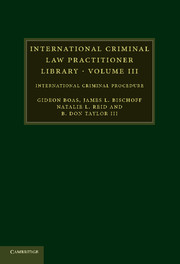Book contents
- Frontmatter
- Contents
- Foreword
- Table of authorities
- Table of short forms
- 1 The nature of international criminal procedure
- 2 Creation and amendment of rules of international criminal procedure
- 3 Procedures related to primacy and complementarity
- 4 Investigations, rights of suspects, and detention
- 5 Defence counsel, amici curiae, and the different forms of representation of accused
- 6 Pre-trial proceedings
- 7 Trial proceedings
- 8 The role and status of victims in international criminal procedure
- 9 Evidence
- 10 Judgement and sentencing
- 11 Appeal and revision
- 12 Conclusion
- Index
- References
3 - Procedures related to primacy and complementarity
Published online by Cambridge University Press: 05 August 2011
- Frontmatter
- Contents
- Foreword
- Table of authorities
- Table of short forms
- 1 The nature of international criminal procedure
- 2 Creation and amendment of rules of international criminal procedure
- 3 Procedures related to primacy and complementarity
- 4 Investigations, rights of suspects, and detention
- 5 Defence counsel, amici curiae, and the different forms of representation of accused
- 6 Pre-trial proceedings
- 7 Trial proceedings
- 8 The role and status of victims in international criminal procedure
- 9 Evidence
- 10 Judgement and sentencing
- 11 Appeal and revision
- 12 Conclusion
- Index
- References
Summary
National courts bear the primary responsibility for trying international crimes, under one or more of five bases of jurisdiction recognised in international law: territoriality, nationality, the protective principle, passive personality, and universality. Yet for a variety of reasons, states have usually failed to exercise any of these forms of jurisdiction to prosecute domestically. Most common among these reasons are a lack of domestic implementing legislation; a structural inability to prosecute, such as a dearth of judicial competence or catastrophic events damaging the legal system's integrity; or an unwillingness to prosecute, as could result from a judiciary that is corrupt, biased, or not independent from political leaders' whims. Seeking to prevent impunity for those who would otherwise escape prosecution in a national court, the international community has set up various international and hybrid criminal tribunals in the last two decades as supplements to or substitutes for national courts. In the principal tribunals examined in this series – the ICTY, ICTR, ICC, and SCSL – the tribunal's statute does not purport to strip national courts of jurisdiction, but instead establishes the tribunal's jurisdiction as concurrent with that of national courts.
Concurrent jurisdiction reinforces the obligation of states, in the first instance, to prosecute international crimes, but also acknowledges the inability of international tribunals to handle the hundreds or thousands of potential cases themselves.
- Type
- Chapter
- Information
- International Criminal Law Practitioner LibraryInternational Criminal Procedure, pp. 46 - 101Publisher: Cambridge University PressPrint publication year: 2011

